In our digital age, e-commerce is key to our lives. More than ever, we shop online. This makes strong security a must. With the rise in cyber attacks, protecting online stores is vital. It keeps both customers and businesses safe.
Staying safe online involves many parts. E-commerce websites need to focus on privacy, keeping data safe, making sure people are who they say they are, and stopping them from denying their actions. It’s important to know the risks, like phishing, malware, and trying many passwords to find the right one. When businesses use many layers of security and keep their websites safe with SSL certificates, they do a lot to avoid these threats. Setting up strong rules for passwords also helps.
Key Takeaways : E-commerce Shopping
- In e-commerce, keeping things secure is a big deal. It protects businesses and their shoppers.
- To fight off dangers like phishing and malware, it’s key to know about these threats.
- Doing things like setting up layers of security, using SSL certificates, and having good passwords does a lot to keep bad actors out.
- Always updating software and adding security tools can help keep an online store safe.
- Picking a hosting service that’s known for being safe is also very important for an e-commerce site’s overall security.
What is E-commerce Security?
E-commerce security is vital for online purchases. It keeps businesses and customers safe. This protection covers everything from choosing items to making payments.
Privacy
Keeping customer data safe is at the core of e-commerce security. Privacy measures stop both inside and outside threats. This keeps personal and payment info safe. Businesses can gain customer trust by keeping their data private.
Integrity
Integrity ensures customer and transaction data are correct and reliable. It’s about making sure no one changes this data. This is key for customers to trust their shopping experience is smooth and accurate.
Authentication
Authentication checks if the e-commerce business and its customers are who they say. It shows the online store is real and trustworthy. Secure login methods and multi-step checks stop fraud and keep out unauthorized people.
Non-repudiation
Non-repudiation means no one can say they weren’t part of a transaction. It creates a clear record and helps avoid disagreements. With this, e-commerce places greater importance on honesty and responsibility during sales.
Follow these security principles closely to protect your online store and keep customer trust strong. Watching over ecommerce security measures, ecommerce security protocols, and online transaction security is key.
Common E-commerce Security Threats

The e-commerce world is growing fast, but so are the risks. It’s crucial to watch out for ecommerce security threats, common online shopping attacks, and ecommerce cyberattacks. This is key to keep your customers and business safe.
Phishing
Phishing scams aim to get your personal info like logins or bank details. They do this by sending fake emails or creating false websites. These tricks make you think you’re dealing with known companies.
Malware and Ransomware
Malware and ransomware are major threats. They can get into your systems, cause problems, and expose customer data. Ransomware can lock up your website until you pay up.
SQL Injection
Hackers use SQL injection to get into your website’s database. This allows them to mess with your data. They could steal customer info and do more harm.
Cross-Site Scripting (XSS)
XSS attacks add bad code to web pages through user inputs. If you visit these pages, the code runs. This can lead to data theft and other dangers.
Brute Force Attacks
Hackers try many username and password combos with automated tools. They want in your systems. A good password rule can stop them.
E-Skimming
E-skimming targets your payment systems, grabbing credit card info as customers enter it. Cybercriminals use malware or scripts for this.
To keep your online business safe, you must know about these ecommerce security threats and common online shopping attacks. This is the first step in making sure your business and customers are secure.
Best Practices for E-commerce Security
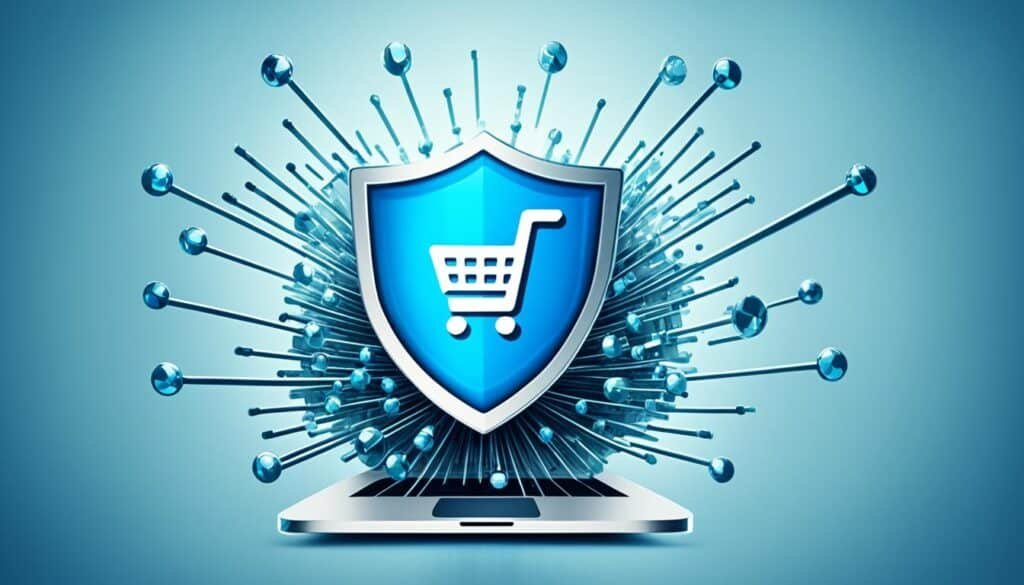
Keeping your online store safe is vital today. To keep customer data secure, strong ecommerce security practices are necessary. You should use layers of security and make sure your website is secure with SSL certificates.
Use Multilayer Security
A multilayer security plan is crucial for your online shop. It means having many levels of security in place. So, even if one security part fails, there are others to stop attackers. Here are some ways to do this:
- Put your website’s content on a content delivery network (CDN) for an added security layer.
- Have multi-factor authentication for when customers log in to add more security.
Secure Website with SSL Certificates
Using SSL (Secure Sockets Layer) certificates is a must for your online shop. SSL makes sure that info like credit card numbers is safe as it moves between the customer’s browser and your site. It makes your website safe, building trust with your shoppers.
“Using multilayer security and SSL certificates are great for keeping your online shop and customers safe.”
Importance of Strong Passwords
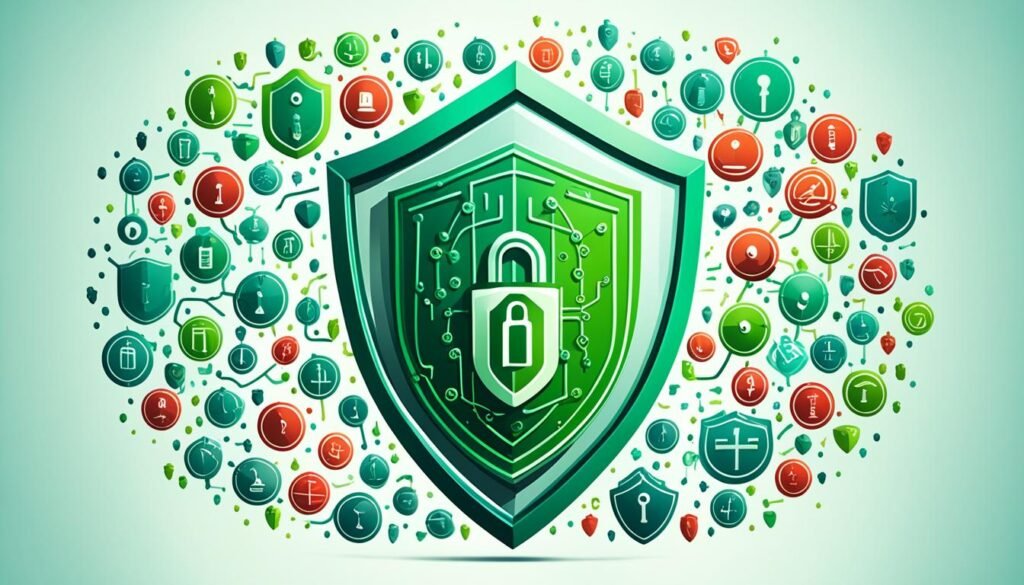
In today’s e-commerce, protecting customer accounts is key. Weak passwords are a big risk. They let hackers in to steal private data. Shockingly, over 23 million accounts were hacked because of simple passwords like “123456.”
For ecommerce password security to be strong, companies need to stress the use of complex passwords. These passwords should mix letters, numbers, and symbols. This makes them tough for hackers to guess. Changing passwords often and not using the same one for many accounts helps stop attacks.
“A strong password is the first line of defense against unauthorized access to your online store and customer data.”
Teaching customers about good password habits helps. When users pick strong passwords, e-commerce sites are safer from attacks. This helps keep the company and its customers’ data secure. It’s a key part of keeping an online store safe.
| Weak Password | Strong Password |
|---|---|
| 123456 | Ht8#Xp2Kj9L |
| password | Zp@9Ym7Qw3N |
| qwerty | Bv5!Ls2Rt4D |
By following these tips, e-commerce businesses can make ecommerce password security strong. This builds trust and loyalty with customers in the digital world.
Choosing a Secure Hosting Provider
Choosing a reliable hosting provider is key for ecommerce hosting security. They store your online shop’s files. So, pick one with strong security to keep your customer info safe and maintain your secure web hosting for online stores.
Priority features in ecommerce hosting security are important. These include:
- SSL (Secure Sockets Layer) certificates to encrypt data transmission
- DDoS (Distributed Denial of Service) protection to guard against attacks
- Encryption protocols to protect your data at rest
- Robust malware detection and removal capabilities
Also, make sure your host has a good disaster recovery plan. This helps them quickly fix any problems. It means they can get your reliable hosting for ecommerce site back up after a breach or other issue.
“Picking a safe and reliable hosting provider is crucial for your ecommerce success. It’s the start for your shop’s security and performance.”
By checking the security and recovery readiness of different hosts, your online shop can thrive. This protects your customers’ faith in your business.
Installing SSL Certificates
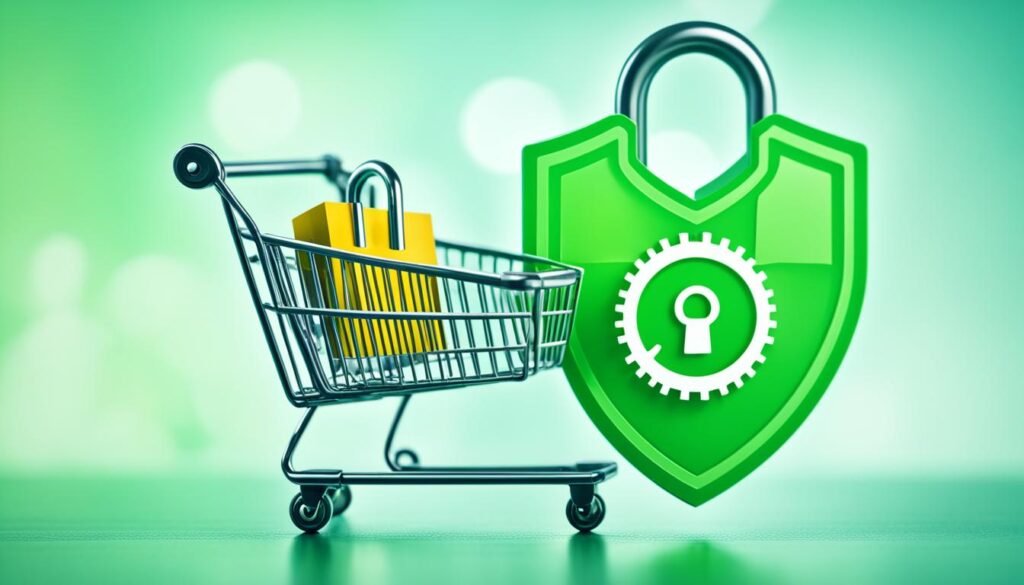
Security is super important in the e-commerce world. To keep your online store safe, installing SSL (Secure Sockets Layer) certificates is key. Think of SSL as a digital padlock. It encodes information between your website and your customer’s device. This makes online transactions safe.
The “S” in HTTPS shows your site is secure. It comes from having an SSL certificate. This makes customers trust your site more. It also helps your site show up better on search engines. Websites in e-commerce need PCI compliance. This means you must use SSL to protect users’ data from cyber threats.
Steps to Install an SSL Certificate
- Get an SSL certificate from a trusted source like Verisign or Comodo.
- Check that your hosting provider supports SSL. They need to help you install it.
- Install the SSL certificate following your host’s directions. This usually means uploading files and changing server settings.
- After installing, update all links on your website to use HTTPS.
- Test your SSL by checking your site with HTTPS. Make sure it works.
Using eCommerce SSL certificates is important for securing online shopping. It helps build trust in your brand. By using HTTPS, you protect your customers’ info and make your online store safer.
“SSL is more than security, it’s about trust. And building trust online can help your business grow.”
Security Plugins and Anti-Malware Software
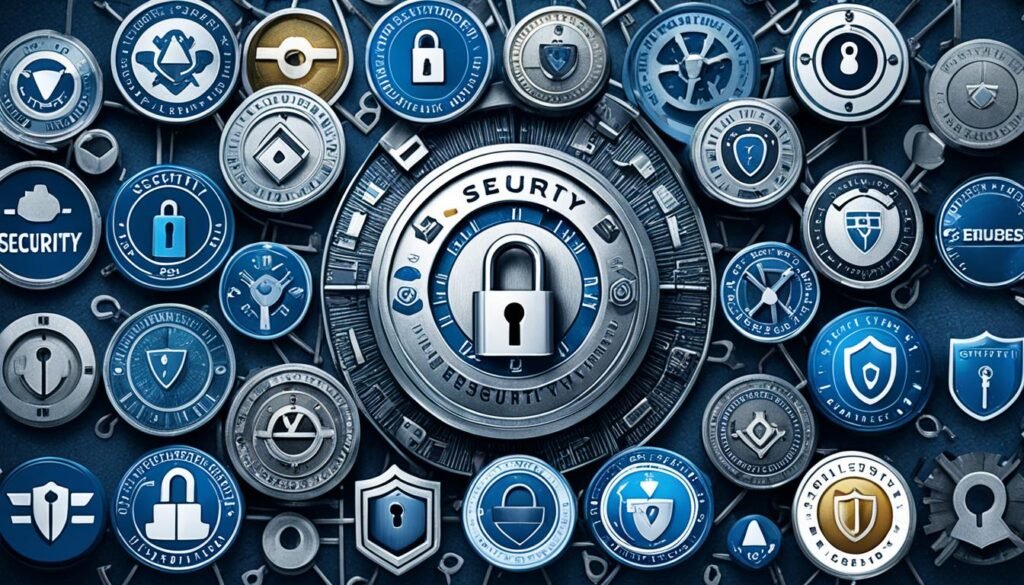
In today’s world, protecting your online store is crucial. This includes both the basics like SSL certificates and more advanced methods. For example, many business owners add strong security plugins and anti-malware software.
These tools are vital against new threats that target ecommerce stores. They guard against things like bot attacks, malware, and SQL injections. With the help of ecommerce security plugins, you’re able to block harmful networks. You can also remove threats from your site, ensuring your customers’ data is safe.
Wordfence, Keyy, and Sucuri are among the top choices for ecommerce site protection. They come with many features made for keeping online stores safe. For extra protection, anti-virus software specifically designed for online shops can be used. ESET Endpoint Security, AVG, and Norton are some trusted brands in this area. They help keep your store safe from a range of cyber dangers.
| Security Plugin | Key Features |
|---|---|
| Wordfence | Real-time traffic monitoring, malware scanning, firewall protection |
| Keyy | Two-factor authentication, login security, malware removal |
| Sucuri | Website malware scanning, blacklist monitoring, incident response |
Using such advanced ecommerce security plugins and anti-virus software can greatly strengthen your store’s security. It helps protect your business from the constantly changing world of cyber threats. By staying proactive, you ensure your ecommerce site’s success and safety in the long run.
Timely Software Updates

In the fast-paced world of online sales, keeping software up to date is vital. Developers patch security holes and add new safeguards often. This keeps your online shop safe from hackers and maintains the security of your ecommerce platform.
To avoid cyber threats, turn on automatic updates for your software. It makes sure your store is always running the latest safe version. Yet, you must also check for updates and install them. Not staying current puts your ecommerce software at risk from new threats.
Updating your software benefits more than just security. It also brings in new functions and improves user experience. By focusing on timely updates, your store will be secure, up-to-date, and ready to offer a smooth shopping journey.
The Importance of Updating Your Online Store
Up-to-date software means a secure and reliable online store. Here’s why making sure your ecommerce software is updated is key:
- It fixes security holes, keeping hackers out.
- Old software can mean lost customer data.
- The latest updates can make your site faster and better for customers.
- It helps you follow new industry rules and practices.
| Benefit | Description |
|---|---|
| Security | Patching vulnerabilities and preventing data breaches |
| Performance | Improving speed, efficiency, and user experience |
| Compliance | Maintaining industry standards and regulations |
Putting timely updates first helps your online store thrive and meet the latest security rules. This is key for your ecommerce business’s success and future.
E-commerce Shopping
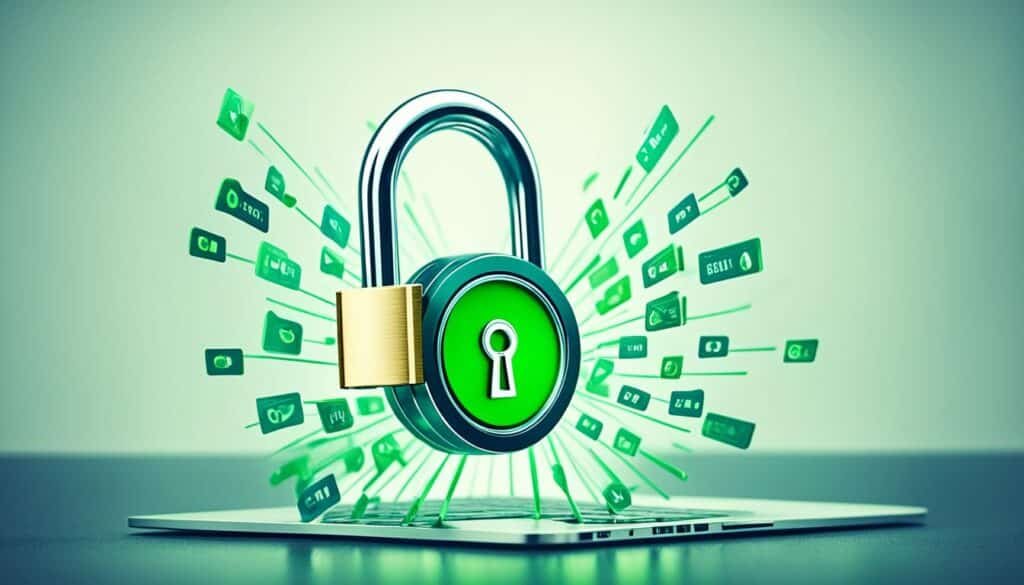
Keeping online shopping safe is key for e-commerce success. If you run an online store, make sure to protect your customers’ info. If you don’t, it could cause legal trouble, data breaches, and trust loss.
To have secure online shopping, remember some important things. First, set up strong security measures to protect customer data in ecommerce deals. Make sure your payment gateways are safe, use SSL certificates, and keep your security knowledge fresh.
To make sure your customers are safe when they shop, here are some tips for safe ecommerce transactions:
- Use a PCI-compliant payment processor to handle all financial transactions.
- Always update your online shop’s platform and software to fix security weak spots.
- Use two-factor authentication and other high-level safety features to keep customer accounts safe.
- Teach your customers how to stay safe when they shop online, like using strong passwords and avoiding phishing emails.
- Keep an eye on your website and network to spot any odd activity or hacking attempts.
“The security of our customers’ data is our top priority. We are committed to providing a safe and seamless shopping experience on our ecommerce platform.”
Making secure online shopping a top goal helps you win customer trust. This trust is crucial for your online store’s success in the tough e-commerce market.
Also Read : Exploring The Pitfalls Of Shopping Fast Fashion: A Critical Analysis
Conclusion
Ecommerce security is vital for any online store’s success. It protects against threats like phishing, malware, and SQL injection. Knowing these and acting to secure operations and customer data is crucial.
Using multilayer security is one of the best things to do. Don’t forget to get SSL certificates and update software regularly. These steps help keep online shops safe.
Buying ecommerce security means more than just defending against cyber attacks. It’s also about making customers feel safe. When people trust that their info is secure, they’re happier to buy from you.
Your brand gains loyal customers when they know their data is safe. The value of ecommerce security today is very high.
By taking the practices spoken about in this piece, online stores can be safer. They can also follow the rules and stay in business long-term. Making security a priority makes shopping with you a great experience for customers.
FAQs
Q1.What is E-commerce Security?
E-commerce security is a rulebook for safe online buying. It protects your personal and payment info. These rules keep your online shopping safe.
Q2.What are the common E-commerce Security Threats?
Online thieves use many tricks to steal your info. They may send fake emails to trick you (phishing). Or, they can infect your computer with harmful software or malware. Other threats include sneaky code attacks (SQL injection), stealing your credit card details (e-skimming), and more.
Q3.What are the Best Practices for E-commerce Security?
To keep your store safe, use many layers of security. Also, make sure your site has an SSL certificate. And always choose strong passwords. These steps help to protect your customers’ data.
Q4.Why is it Important to Choose a Secure Hosting Provider?
It’s crucial to pick a hosting provider known for its security. They should shield your site from cyber-attacks. SSL certificates, DDoS protection, and malware checks are a must. Your customers’ trust depends on it.
Q4.How Important are Software Updates for E-commerce Security?
Regular software updates are your best defense. Always update your platform, plugins, and themes. By doing so, you’ll fix known security holes. Automatic updates make this easier. They keep your e-store safe without you needing to worry.





